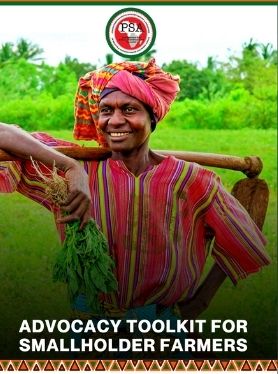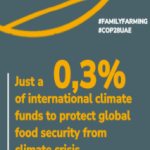Advocacy Toolkit for Smallholder Farmers
 This toolkit is a comprehensive guide designed to empower smallholder farmers, agriculture advocates, community leaders and stakeholders to champion the cause of smallholder farmers, fostering a culture of public social accountability within the agriculture sector. Through strategic advocacy, this tool aims to bridge the gap between policy and practice, ensuring that the needs of smallholder farmers are not just acknowledged, but actively addressed for a sustainable and equitable agricultural future.
This toolkit is a comprehensive guide designed to empower smallholder farmers, agriculture advocates, community leaders and stakeholders to champion the cause of smallholder farmers, fostering a culture of public social accountability within the agriculture sector. Through strategic advocacy, this tool aims to bridge the gap between policy and practice, ensuring that the needs of smallholder farmers are not just acknowledged, but actively addressed for a sustainable and equitable agricultural future.
This booklet is organized into eight essential sections, each designed to provide a comprehensive understanding of social accountability and its practical applications. Section 2 and Section 3 lay the foundation by defining social accountability and detailing its key benefits. Following this, Section 4 delves into the five critical steps of the Public Service Accountability Monitoring (PSAM) processes, providing a structured approach to implementing social accountability initiatives.
Further, Section 5 introduces a variety of social accountability tools and activities, equipping readers with practical resources for effective engagement. Advocacy is thoroughly explored in Section 7, which not only highlights its key features and levels but also provides guidance on important considerations before initiating advocacy efforts. Additionally, this section offers a step-by-step guide on developing a successful advocacy plan, ensuring that readers are well-prepared to advocate effectively within their communities and beyond.
This advocacy toolkit offers significant benefits to agriculture stakeholders and farmers by empowering them with the knowledge and tools needed to effectively champion their interests. By utilizing this toolkit, these groups can better understand and navigate the social accountability processes, enabling them to hold decision-makers accountable and influence policies that directly impact their livelihoods. The toolkit’s structured guidance on advocacy, including key steps in developing an advocacy plan, ensures that stakeholders are equipped to strategically address challenges, promote sustainable agricultural practices and advocate for the resources and support needed to thrive. Ultimately, this empowers communities to take an active role in shaping the policies and practices that affect their agricultural activities and overall well-being.
Download























